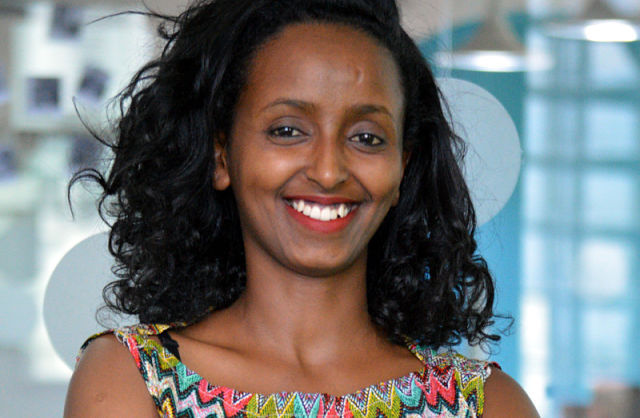 Bethelhem Dejene Abebe. (Maritz Africa)
Bethelhem Dejene Abebe. (Maritz Africa)
How We Made It In Africa
During the first year of her studies at Addis Ababa University, Bethelhem Dejene Abebe visited the Atkilt Tera market, the biggest fruit and vegetable market in Ethiopia, with her mother. The conditions at the market shocked her enough to decide that waste management was what she wanted to commit her life to.
“It was surprisingly dirty, it smelled really bad. It really was not healthy,” she says. “It was at that moment that I decided that I should do something to try and make a difference.”
Bethelhem is co-founder and CEO of Zafree Papers, a company that is introducing a 100% tree-free paper pulp made from agricultural waste. Instead of using wood to create paper pulp, Zafree Papers’ process utilises wheat and barley straw, preventing smallholder farmers from burning this waste material that leads to air pollution. The company’s processing facility is currently being constructed in Debre Berhan (Read more: City on the move: Debre Berhan, Ethiopia), about 120km north-east of Ethiopia’s capital Addis Ababa.
In her own words, the road to where Zafree is today has not been easy. It has been tough. “I think I have lost count of how many times I have failed,” she says.
From concept to business plan
Since the visit to the market there have been a few attempts that did not reach the goals Bethelhem had in mind. “However, I believe that when one door closes, another opens. One failure leads to another success,” she says.
First, she only recycled the paper waste from her own household. Then she embarked on research on how to scale that recycling business to something more commercial. She eventually decided to move away from recycling, to producing wood-free paper pulp that could be provided to paper manufacturers, utilising agricultural waste without sacrificing the quality of the eventual end product.
Then came the knocking on doors. “I have knocked on all the doors,” she laughs. “We have more than 20 private banks in Ethiopia and I have been to all of them, knowing nothing, simply asking loans without having any collateral.”
She eventually got project finance from the Development Bank of Ethiopia and procured land in Debre Berhan’s industrial park. All that was required from her, was 25% equity. “I didn’t even know what an investor was at that stage,” she says.
Friends then recommended that Bethelhem enrol for an entrepreneurship training workshop offered by the Entrepreneurship Development Centre in Ethiopia. “This was a turning point for me. I learnt about entrepreneurship, I learnt the dos and don’ts and I met a lot of people that showed me the way to start my business and raise funds,” she says.
Soon thereafter, in 2018, Zafree Papers was selected as part of BlueMoon, an incubation programme for startups in Ethiopia. BlueMoon provided seed money and Zafree Papers was on its way.
And in 2019, Bethelhem was chosen for the Tony Elumelu Foundation Entrepreneurship Programme, landing $5,000 along with nine months of training and mentorship. She also received the Seedstars DOEN Land Restoration Prize of $10,000 in that same year.
Finding innovative funding solutions
The seed money from BlueMoon, the grants, personal finances as well as support from family and friends provided enough capital to get construction started on the processing plant.
“This money is covering our pre-operational activity and construction costs,” Bethelhem says. “It is a bit challenging when you are a startup as investors, especially local investors, want a majority share, which we did not want at this stage.”
Zafree Papers does have an international investor lined up for the machinery it requires, but as the final terms of the agreement are still being put in place, Bethelhem did not want to divulge too much…
“We have customer commitments in Ethiopia, Nigeria, Eritrea, Kenya and Tanzania,” says Bethelhem.
—
Join the conversation on Twitter and Facebook.

























